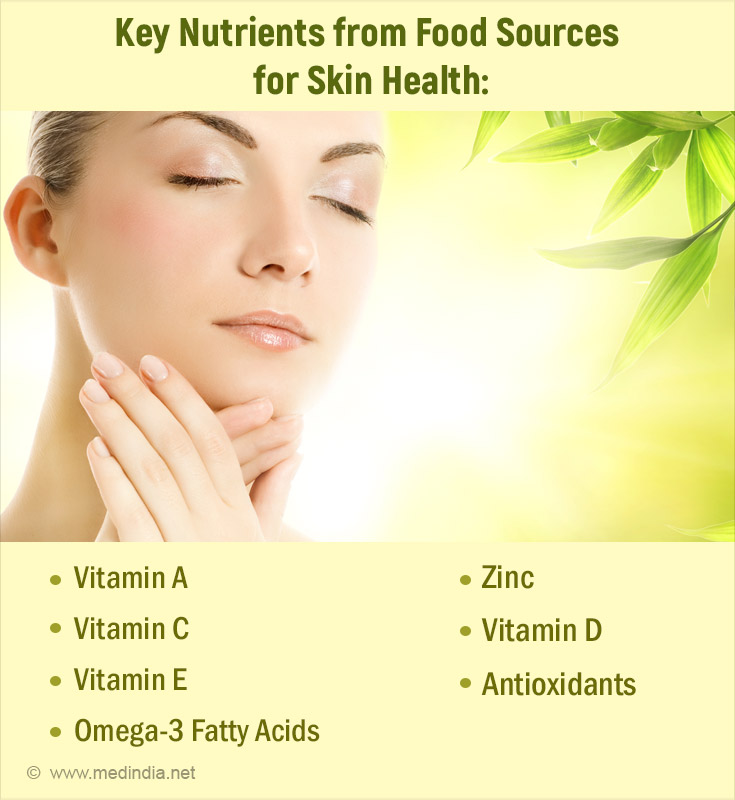- Role of Micronutrients in Skin Health and Function - (https://www.ncbi.nlm.nih.gov/pmc/articles/PMC4428712/)
About
Healthy skin is supple, well moisturized, and spot-free or irritation-free. Its tone is even, and the skin stands well against environmental stressors while having a natural glow to it. Healthy skin works very efficiently as a protective barrier, allowing no harmful bacteria and toxins in but letting moisture and other required nutrients in.(1✔ ✔Trusted Source
Role of Micronutrients in Skin Health and Function
Go to source)
Indicators of Healthy Skin
Even Texture: There should neither be any roughness nor bumps on the skin.
Moisturized Texture: Not too oily and not too dry hydrated skin.
Firmness: Skin springs back after some pressing.
Even Toner: No inflammation and no discoloration seen.
Glow: Natural shine from good blood flow and enough moisture.
Healthy-looking skin is a reflection of good physical care but also the inside, what you eat, since what you eat plays a huge role in your skin's health.
Did You Know?
Antioxidants like vitamin C and E not only protect your skin from UV damage but also boost collagen production! #skincaretips #medindia
Importance of Nutrition for Skin Health
If you feed your body with good nutrients that come along with a very healthy diet, then expect to have good skin. Rich in nutrients, nutrients contribute in one way or another to:
Cellular Regeneration in the Skin: Contributes to the formation, regeneration of skin cells.
Hydration: the maintenance of skin’s moisture and tone.
Protection: This shields the skin from outside harm and undue aggressions such as oxidation.

Key Nutrients for Healthy Skin
1. Vitamin A: The Skin Protector
Benefits:
Cell Turnover: It assists in the elimination of keratinized skin cells and in skin cell regeneration hence provides skin with a smooth surface .
Acne Management: It also decreases the amount of sebum produced, meaning that no pores would be blocked in any case; therefore no acne for you either.
Anti-Aging: It makes the wrinkles and fine lines to be invisible It is one way of making the wrinkles and fine lines of a person to become invisible. Thus, no matter what, it is always contained in the products that are developed under the anti-aging concept.
Recommended Food Sources:
Sweet Potatoes: Beta carotene is plenty; it is being converted to vitamin A within the body.
Vegetables
Carrots: God’s gift to humans in terms of nutrition: the natural source of beta-carotene-the generator of vitamin A, good for the skin.
Spinach: Endless store of vitamins and to give hydration and elastic nature to the skin.
Kale: Full of vitamins A, C, and K.
Egg: The richest source of retinol, which is the active form of vit A.
2. Vitamin C: The Collagen Booster
Benefits:
Collagen Synthesis: This is required for producing collagen which shall help provide the shape and elasticity in your skin.
Antioxidant Protection: Helps shield the skin from damage that results from oxidation due to UV Radiation and pollution.
Brightening: It fades away the darkness of dark spots; at the same time it makes the skin’s texture smoother.
Recommended Food Sources:
Citrus Fruits: Oranges, lemons and grapefruits contain fairly high amounts of vitamin C.
Berries: That is why strawberries, blueberries, and raspberries fruit contain antioxidants and vitamin C.
Bell Peppers: The more it shines the more reddish or yellowish it is because it’s a very very rich source of Vitamin C.
Broccoli: This is a cruciferous vegetable packed with vitamins and minerals with the highest level of vitamin C per serving of vegetables.
3. Vitamin E: The Hydrator
Benefits:
Antioxidant Activity: It avoids the free radicals that harm the skin from coming into contact with it.
Moisturizing Action: They enhance the look of the skin by preventing skin dryness, and therefore makes the texture fabulous.
Healing Activity: It relieves the skin and improved the overall appearance of the skin in general.
Recommended Food Sources:
Nuts and Seeds: Almonds and sunflower seeds are sources of vitamin E which is present in generous proportions.
Spinach: Apart from all other nutrients, spinach contains good quantities of Vitamin E.
Avocado: Storing house of good fat and Vitamin E – a very good antioxidant for the skin.
Olive Oil: Loaded with good cholesterol, loaded with vitamins E.
4. Omega-3 Fatty Acids: The Anti-Inflammatory Agent
Benefits:
Inflammation Reduction: Reduces inflammation of the skin, clears up acne, and eczema.
Skin Barrier Support: Strengthens up the lipid layer of the skin raised ability to retains moisture and prevent dryness.
Hydration: It moisturizes and elasticity of the skin and helps it to remain firm all the time.
Recommended Food Sources:
Fatty Fish: The fish that contain omega-3 are salmon, mackerel, and sardines.
Flaxseeds: Flax seed is the best plant source of omega 3 fatty acids and ground flaxseed is recommended as one of the good sources of Omega-3 fatty acid.
Chia Seeds: It does turn quite a lot to be a wonderful plant-based value besides massive quantities of fiber and omega three.
Walnuts: Contains good amounts of Omega-3 fatty acids.
5. Zinc: The Miracle Mineral
Benefits:
Wound Healing: Fatty acids are very important in the repair and regenerative process of the skin, and are wonderful in the treatment of acne and skin diseases.
Control of the Oil: It helps to regulate oil development; this might be useful in controlling acne.
Supports the Immunity: They modulate an active immune system hence supporting general skin care.
Recommended Food Sources:
Shellfish: One of the highest biological yields of zinc is obtained from oysters.
Meat: Zinc sources include beef and poultry Vision: The improved nutritional quality identified determined the following vision;
Legumes: Chickpeas, lentils and beans are the zinc dense plant sources of zinc.
Nuts and Seeds: Some of the types of nutrients are better sources of the mineral than others and the following are the best options for it; Pumpkin seeds as well as cashews.
6. Vitamin D: The Sunshine Vitamin
Health Benefits:
Skin Cell Growth and Repair: Vitamin D in general is involved in maintaining the integrity of skin cells and their growth as well as metabolism.
Reduction of Skin Disorders: Vitamin D is useful to reduce odds of several skin diseases like psoriasis and eczema.
Immune Function: Enhances the immunological response and perhaps the physiologic capacity to preserve healthier skin.
Recommended Food Sources:
Fatty Fish: Salmon and mackerel also contain omega 3s but they also contain vitamin D.
Fortified Foods: Many dairy products and plant-based milks are fortified with Vitamin D and in some countries, most other breakfast cereals as well.
Egg Yolks: These should be relied upon to offer a small but adequate contribution to your daily vitamin D intake.
Sunlight Exposure: This is the production of vitamin D directly from the sun on to skin out. That is the reason why people should get some amount of sun exposure which is not dangerous but healthy for their body.
7. Antioxidants: The free radical fighters
Benefits:
Protection against damage: Free radical induces oxidative stress that accelerates aging and skin diseases and antioxidants help prevent this.
To the health of the skin: They aid in a healthy looking skin and possibly only mask the skin flaws and make fine lines and wrinkles appear later.
Recommended Food Sources:
Berries: These berries that consist of antioxidants include; blueberries, strawberries and black berries.
Green tea: It is packed full with antioxidants and indeed provides some sort of help in the improvement of the skin, safeguarding it from UV rays.
Dark chocolate: This has flavonoids, which act to shield your skin from UV-harm and contribute to additional moistening.
Fruits and vegetables: Bright colored fruits and vegetables for source of antioxidants; tomatoes and carrots and green vegetables respectively.
Health Tips for Healthy Skin
- Eat a nutrient-rich diet: Vitamin A, C and E containing foods and foods containing healthy fats are fine for the skin. These healthy fats are also found in fruits, vegetables and some omega-3 foods including fish, flax seed and nuts.
- Stay hydrated: Drink lots of water for moisturizing sheen purpose and for seducing the skin to go through a detoxifying process.
- Get Regular Exercise: Physical activity on its part helps circulation that brings oxygen and the necessary nutrients to the skin to make it look healthy.
- Sleep well: Take time to sleep between seven to nine hours so that you can enable your skin to repair itself and regenerate and not have the skin become dark or dull.
- Manage Stress: Perform stress busting exercises like yoga or meditation since it will help prevent skin problems like acne or eczema.
- Sun Protection: Use of broad-spectrum creams with SPF of 30 or higher, protective clothing minimizes harm to the skin from ultraviolet B radiation that causes skin to wrinkle.
- Avoid Smoking and Excessive Alcohol: These cause drying of the skin resulting to wrinkle, dull skin and elasticity.
- Gentle Routine Skin Care: Lukewarm water and gentle creams and avoiding scrubbing the skin in order to reduce the skin’s sensitivity and inflammation.
- Moisturize Daily: You should apply a moisturizer on your skin depending on your skin type so that the skin will retain moisture, thus making the human skin look less dry and can also be easily elastic.
- Consult a Dermatologist at Regular Intervals: You may go for a check up with a dermatologist so he may examine you regularly so that he may see any issue that may be related to skin cancer from developing.
These nutrients have antioxidants, anti-inflammatories as well as other things that aid in caring for the skin by shielding it, moisturizing it and healing it. Alongside that it might be beneficial for the skin to drink water, prevent the skin from the sun, and use good skin care products as well as choosing the right diets would be perfect for the skin. Again it has to be emphasized that due to individual differences every single person should consult a healthcare provider or registered dietitian.









